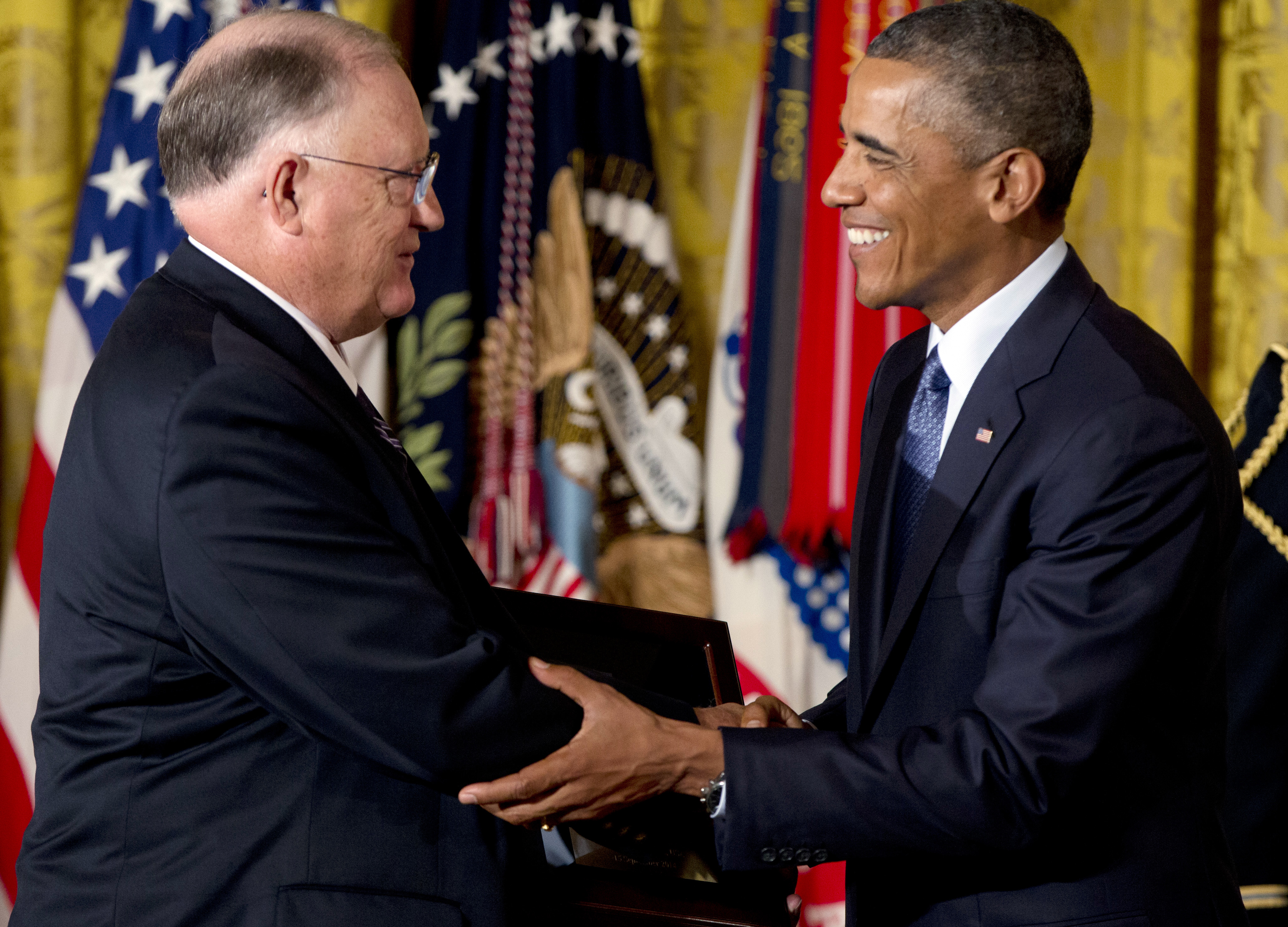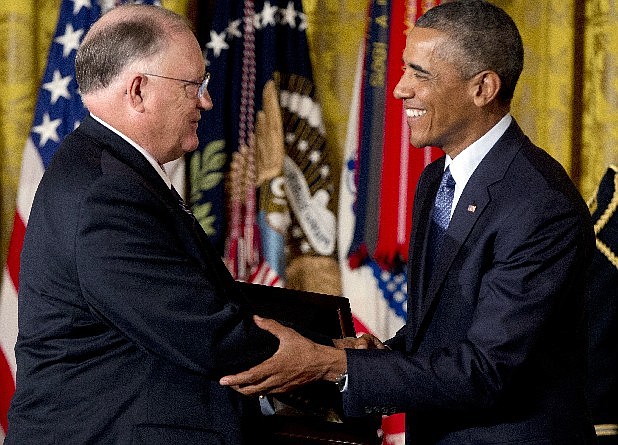 President Barack Obama shakes hands with William Sloat as he presents the Medal of Honor for his brother Army Spc. Donald P. Sloat in the East Room of the White House in Washington on Monday. Donald P. Sloat, of Coweta, Okla., was killed in action on Jan. 17, 1970, at age 20. While on patrol, a soldier in his squad triggered a hand grenade trap that had been placed in their path by enemy forces. According to the White House, Sloat picked up the live grenade, initially to throw it away. When he realized it was about to detonate, he shielded the blast with his own body in order to save the lives of his fellow soldiers.
President Barack Obama shakes hands with William Sloat as he presents the Medal of Honor for his brother Army Spc. Donald P. Sloat in the East Room of the White House in Washington on Monday. Donald P. Sloat, of Coweta, Okla., was killed in action on Jan. 17, 1970, at age 20. While on patrol, a soldier in his squad triggered a hand grenade trap that had been placed in their path by enemy forces. According to the White House, Sloat picked up the live grenade, initially to throw it away. When he realized it was about to detonate, he shielded the blast with his own body in order to save the lives of his fellow soldiers.WASHINGTON - Two Vietnam War soldiers - one still living, one killed in action - received the Medal of Honor in a White House ceremony on Monday, nearly 50 years after they threw themselves into harm's way to protect their brothers in combat. President Barack Obama praised the soldiers as patriots whose sacrifices had never been fully realized by a nation divided over the legacy of the Vietnam War.
Army Command Sgt. Maj. Bennie G. Adkins survived his injuries. Army Spc. Donald P. Sloat did not. It took an act of Congress to allow each to receive the medal so many decades after the fact.
"Over the decades, our Vietnam veterans didn't always receive the thanks and respect they deserved. That's a fact," Obama said. "But as we have been reminded again today, our Vietnam vets were patriots and are patriots."
"You served with valor, you made us proud, and your service is with us for eternity," Obama told the audience, which included Defense Secretary Chuck Hagel - himself a Vietnam veteran - and others who received the Medal of Honor after coming home from the rice paddies of Vietnam.
Drafted into the Army at age 22 from his home in rural Oklahoma, Adkins was deployed three times to Vietnam with the Special Forces. He was already being recognized for actions during his second combat tour when, in 1966, a large North Vietnamese force attacked his camp.
For 38 hours, Adkins fought in close combat against enemy forces, dodging exploding mortar rounds as he dragged wounded soldiers to safety. When the order was finally given to evacuate camp, Adkins refused to leave comrades behind.
By the time he and his group made its way to the extraction point, the last evacuation helicopter had left. So Adkins led his fellow soldiers into the jungle, where they evaded enemy soldiers and even a tiger before being evacuated 48 hours later.
Adkins, visibly older and walking with a cane, stood tall in his blue uniform and epaulettes, saluting fellow troops after Obama draped the medal around his neck. Adkins now lives in Opelika, Alabama.
"This Medal of Honor belongs to the other 16 Special Forces soldiers with me," Adkins said after the ceremony.
Sloat, of Coweta, Oklahoma, was 20 years old when his squad was patrolling a stretch of territory known for frequent North Vietnamese and Viet Cong activity. Unwittingly, the soldier at the head of the pack triggered a tripwire, detonating a booby-trap set there by enemy forces.
The grenade rolled down the hill toward Sloat, and when he picked it up, he realized it was too late to throw it out of harm's way. So with the explosion imminent, Sloat held on to the grenade, pulling it close and bending over so that his body would shield his fellow soldiers from the blast.
Sloat's brother, William, accepted the medal from the president.
Monday's ceremony in the East Room, roughly half a century after the war, had a markedly different feel from the traditional White House gathering of family and friends and a young man or woman recently back from battle in Iraq or Afghanistan. Obama's tribute to the two soldiers served as a reminder of the painful history of Vietnam veterans being maligned or blamed upon returning from that unpopular war - an episode Obama has called a disgrace and a national shame.
Medal of Honor recommendations typically must be made within two years of the act of heroism, and the medal presented within three years. But Congress granted a special exemption for Adkins and Sloat.
"Sometimes even the most extraordinary stories can get lost in the fog of war or the passage of time," Obama said. "When new evidence comes to light, certain actions can be reconsidered for this honor, and it is entirely right and proper that we have done so."
